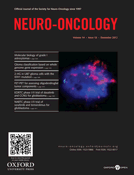
NEURO-ONCOLOGY
Scope & Guideline
Advancing the Frontiers of Brain Tumor Research
Introduction
Aims and Scopes
- Clinical Trials and Treatment Strategies:
The journal emphasizes the importance of clinical trials and innovative treatment strategies for brain tumors, including glioblastoma, meningioma, and pediatric CNS tumors. This includes studies on new drugs, combination therapies, and the effectiveness of existing treatments. - Molecular and Genetic Studies:
Research focusing on the molecular and genetic underpinnings of brain tumors is a core area of interest. This includes studies on genetic mutations, epigenetic modifications, and the identification of biomarkers that can inform prognosis and therapy. - Neuroimaging and Radiomics:
The journal publishes research involving advanced neuroimaging techniques and radiomics, which assess tumor characteristics and predict treatment responses. This includes the integration of machine learning and AI in imaging analysis. - Psychosocial Aspects and Quality of Life:
Recognizing the impact of brain tumors on patients' quality of life, the journal includes studies that explore psychosocial factors, neurocognitive outcomes, and supportive care strategies. - Tumor Microenvironment and Immunology:
Research on the tumor microenvironment and its interaction with immune cells is increasingly highlighted, focusing on how these interactions influence tumor growth, treatment resistance, and potential immunotherapeutic approaches.
Trending and Emerging
- Immunotherapy and Targeted Therapies:
A significant increase in studies related to immunotherapy and targeted therapies is evident, reflecting a shift toward personalized medicine in the treatment of glioblastoma and other CNS tumors. - Liquid Biopsy and Minimal Residual Disease Detection:
Research on liquid biopsies and their role in monitoring treatment responses and detecting minimal residual disease is gaining traction, providing a non-invasive method to track tumor dynamics. - AI and Machine Learning Applications:
The integration of artificial intelligence and machine learning in neuro-oncology research is trending, particularly in imaging analysis and prognostic modeling, enhancing diagnostic accuracy and treatment planning. - Neurocognitive Outcomes and Quality of Life Research:
There is a growing emphasis on understanding neurocognitive outcomes and quality of life for patients undergoing treatment for brain tumors, highlighting the psychosocial aspects of cancer care. - Tumor Microenvironment Studies:
An increasing focus on the tumor microenvironment and its role in tumor biology and treatment resistance is emerging, with research exploring how cellular interactions within the microenvironment influence therapeutic outcomes.
Declining or Waning
- Conventional Chemotherapy Studies:
There is a noticeable decline in studies focusing solely on conventional chemotherapy approaches, as interest shifts towards targeted therapies and immunotherapies that offer more personalized treatment options. - Basic Histopathology Reports:
The frequency of basic histopathology studies has decreased, possibly due to a growing focus on molecular characterization and advanced imaging techniques that provide more detailed insights into tumor biology. - Epidemiological Studies:
While epidemiological studies are still relevant, there appears to be a waning interest in broad epidemiological analyses in favor of more targeted studies that explore specific genetic or molecular factors influencing tumor behavior. - Radiotherapy Alone Studies:
Research focusing only on radiotherapy without exploring combination therapies or advanced techniques is less prevalent, as current trends emphasize integrated treatment strategies. - Studies on Adult Brain Tumors:
The proportion of studies focused exclusively on adult brain tumors is declining as there is a growing emphasis on pediatric neuro-oncology, reflecting increased awareness and research funding in this area.
Similar Journals

Neuro-Oncology Practice
Exploring Complexities in Neurological CancerNeuro-Oncology Practice is a leading journal in the interdisciplinary field of neuro-oncology, published by Oxford University Press. With an ISSN of 2054-2577 and E-ISSN 2054-2585, this journal provides a critical platform for the dissemination of cutting-edge research and clinical advancements since its inception in 2014. As of 2023, it has achieved a Q2 ranking in Medicine (Miscellaneous), Neurology, and Oncology categories, reflecting its esteemed position in the academic community with impressive Scopus rankings, including a 74th percentile in the field of Medicine. Despite its non-open access status, Neuro-Oncology Practice aims to bridge the gap between laboratory research and clinical practice, offering valuable insights for professionals involved in the treatment and study of neurological cancers. The journal actively encourages submissions that explore innovative treatment strategies, enhance patient care, and advance our understanding of the complexities surrounding brain tumors. With a convergence period extending to 2024, it remains a crucial resource for researchers, practitioners, and students who are committed to improving outcomes in the field of neuro-oncology.

World Journal of Clinical Oncology
Transforming Patient Care through Groundbreaking ResearchWorld Journal of Clinical Oncology, published by BAISHIDENG PUBLISHING GROUP INC, stands as a vital resource in the realm of oncology, providing a dedicated platform for the dissemination of cutting-edge research and clinical advancements. With an ISSN of 2218-4333, this journal facilitates a comprehensive exploration of modern oncology challenges and breakthroughs, targeting researchers, healthcare professionals, and students alike. Although it operates under the traditional subscription model, the impactful nature of its content is reflected in its notable ranking of 60 out of 334 in the category of Medicine _ Oncology, placing it in the 82nd percentile among peer publications. Covering significant topics in clinical oncology from 2014 to 2018, the journal has been instrumental in addressing evolving oncology practices and patient care innovations. By publishing high-quality studies, it remains an essential tool for advancing knowledge and fostering collaboration within the global oncology community.
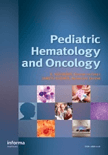
PEDIATRIC HEMATOLOGY AND ONCOLOGY
Empowering healthcare through cutting-edge pediatric studies.Pediatric Hematology and Oncology, published by Taylor & Francis Inc, serves as a vital platform dedicated to the fields of hematology, oncology, and pediatrics, providing a comprehensive avenue for the dissemination of scholarly research and clinical advancements. With an ISSN of 0888-0018 and an E-ISSN of 1521-0669, this journal has successfully converged its expertise over the years from 1984 to 2024. Ranked in the Q3 category for Hematology and Oncology, alongside a Q2 ranking in Pediatrics, Perinatology, and Child Health (2023), it engages a diverse readership comprising researchers, healthcare professionals, and students eager to explore groundbreaking studies in child health and treatment methodologies. While it currently does not offer Open Access options, the journal is widely cited and recognized, particularly in its specialized fields, fostering a rich environment for dialogue and innovation in the management of pediatric hematological and oncological disorders. The journal is based in the United Kingdom at 530 Walnut Street, Ste 850, Philadelphia, PA 19106, making it an essential resource for those pursuing excellence in pediatric medical research.
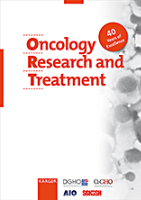
Oncology Research and Treatment
Shaping the landscape of cancer treatment and research.Oncology Research and Treatment, published by KARGER, is a highly regarded academic journal dedicated to advancing the field of oncology through rigorous research and clinical insights. With a history spanning from 1978 to 1997 and continuing from 2013 to 2024, this journal provides a vital platform for researchers and professionals in cancer research, hematology, and related disciplines. Though currently listed in the Q3 tier of 2023 for Cancer Research, Hematology, and Oncology, its growing readership and open access policy enhance its visibility and impact within the scientific community. Based in Switzerland, the journal features diverse access options, reflecting the global importance of oncology research. With a focus on innovative treatments and the latest methodologies, Oncology Research and Treatment plays a crucial role in fostering collaboration and dialogue among researchers, professionals, and students alike, helping to shape the future of cancer care and management.
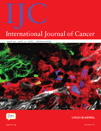
INTERNATIONAL JOURNAL OF CANCER
Advancing cancer research for a healthier tomorrow.INTERNATIONAL JOURNAL OF CANCER, published by Wiley, stands as a premier platform for the dissemination of cutting-edge research in the fields of cancer research and oncology. With an impressive impact factor reflecting its rigorous peer-review process and significant contribution to the scientific community, this journal is categorized in Q1 for both Cancer Research and Oncology as of 2023. It boasts notable rankings, being placed 38th among 404 journals in Medicine - Oncology and 32nd among 230 in Biochemistry, Genetics, and Molecular Biology - Cancer Research, positioning it within the 90th and 86th percentiles, respectively. Since its inception in 1966 and continuing to 2024, the journal has played a pivotal role in advancing our understanding of cancer biology, treatment modalities, and innovative therapeutic approaches. While it operates under a subscription model, the journal is committed to making valuable research accessible to a broader scientific audience. Researchers, professionals, and students alike will find the INTERNATIONAL JOURNAL OF CANCER an essential resource for staying abreast of the latest advancements in cancer science.

CHILDS NERVOUS SYSTEM
Bridging Research and Clinical Practice in Child HealthCHILDS NERVOUS SYSTEM is a distinguished academic journal published by SPRINGER, focusing on the vital intersections of pediatrics, neurology, and child health. With an ISSN of 0256-7040 and an E-ISSN of 1433-0350, this journal has been an important platform for research since its inception in 1985 and continues to contribute significantly to the field, as reflected in its impressive quartile standings: Q3 in Medicine (miscellaneous) and Neurology (clinical), and Q2 in Pediatrics, Perinatology, and Child Health for 2023. Despite its Q3 rankings in two categories, it holds a respectable position in Scopus rankings, showcasing its relevance among peers in pediatric and neurological studies. The journal aims to disseminate new research and insights that enhance the understanding of neurological conditions in children, offering a comprehensive view of both clinical practices and advancements in medicine. Though it currently does not provide Open Access options, its rigorous peer-review process ensures high-quality content that is indispensable for researchers, clinicians, and professionals dedicated to improving child health outcomes.

CNS DRUGS
Empowering Research for Better CNS TherapeuticsCNS DRUGS is a leading journal dedicated to the field of neuroscience, specifically focused on the advancement of pharmacological therapies for central nervous system disorders. Published by ADIS INT LTD, this esteemed journal has maintained a strong impact within its domain, achieving Q1 rankings in 2023 across multiple categories, including Neurology (clinical), Pharmacology (medical), and Psychiatry and Mental Health. With an impressive Scopus ranking as the 11th of 272 in medical pharmacology and high percentiles in psychiatry and neurology, it fosters high-quality research publication and dissemination. Spanning over two decades from 1994 to 2024, CNS DRUGS serves as a vital resource for researchers, professionals, and students alike, providing comprehensive insights that drive innovation in clinical practices. Although primarily a subscription-based journal, the richness of its content makes it an essential addition to any institution's library. Striving to bridge the gap between scientific research and clinical application, CNS DRUGS is positioned at the forefront of neurological and psychiatric pharmacotherapy research.

DRUG RESISTANCE UPDATES
Pioneering insights in cancer and infectious disease management.DRUG RESISTANCE UPDATES is a premier academic journal published by Churchill Livingstone, focusing on the critical areas of drug resistance in various diseases including cancer, infectious diseases, and the pharmacological challenges associated with these conditions. With a robust impact factor and a prestigious Q1 ranking across multiple categories such as Cancer Research, Infectious Diseases, and Pharmacology, this journal is recognized for its significant contributions to the field. Since its inception in 1998 and continuing through to 2024, it has become an essential resource for researchers, clinicians, and policy-makers aiming to understand and combat the evolving challenges of drug resistance. Although it is not an open-access publication, it provides vital insights and research findings that are pivotal in influencing treatment strategies and advancing knowledge within the scientific community. For stellar insights backed by rigorous peer review, DRUG RESISTANCE UPDATES should be on the radar of every professional concerned with the intricacies of modern medicine and pharmacology.

Frontiers in Oncology
Innovating oncology through open access and collaboration.Frontiers in Oncology is a premier open access journal dedicated to advancing the field of oncology through innovative research and knowledge dissemination. Published by FRONTIERS MEDIA SA since 2011, this journal is based in Switzerland and holds an impressive Q2 ranking in both Cancer Research and Oncology as of 2023, highlighting its significance in the academic community. With its commitment to open access, Frontiers in Oncology ensures that vital research is readily available to researchers, healthcare professionals, and students around the globe, enhancing collaboration and fostering breakthroughs in cancer research. The journal's robust Scopus rankings further illustrate its academic influence, with notable positions in the fields of Oncology and Cancer Research. By covering a wide range of topics within oncology, this journal serves as a vital resource, supporting the rapid evolution of cancer treatment, diagnostics, and patient care strategies.
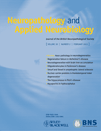
NEUROPATHOLOGY AND APPLIED NEUROBIOLOGY
Unraveling Complexities in Neurology and PathologyNEUROPATHOLOGY AND APPLIED NEUROBIOLOGY is a premier journal dedicated to advancing the understanding of the intricate relationships between pathology and neurobiology. Published by Wiley since 1975, this journal has established itself as a crucial resource for researchers, clinicians, and students interested in the latest insights and developments in the fields of pathology, neurology, and neuroscience. With an impressive history of convergence extending to 2024, it boasts a Q1 ranking in multiple categories including Histology, Neurology, and Pathology, reflecting its high impact and reputation in the academic community. Additionally, it ranks 18th out of 208 in Pathology and Forensic Medicine with a remarkable 91st percentile, signifying its relevance and influence in medical research. While not open access, this journal provides valuable content that contributes significantly to the ongoing discourse in neurobiological advancements and is a vital reference for those engaged in this dynamic field.